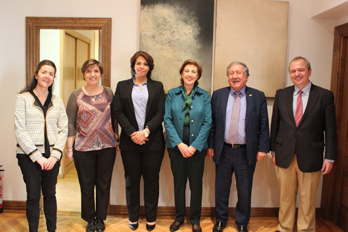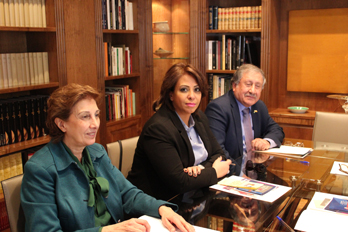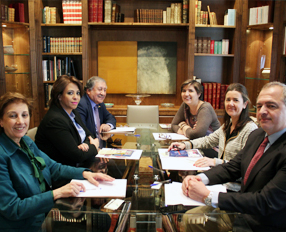
The visit is part of a trip to Spain to promote individual initiatives to promote women’s rights and equality of opportunity in her country and to promote democratic values among young Jordanians.

FPSC: The arrival of the Arab Spring brought voices in favour of a democratic opening in those countries. Has it failed?
RH: With the Arab Spring people got up, also thinking that they would have democracy, that they would be able to influence the constitution, that they would get more liberties. But the result was frustrated because people came to power with very little preparation or little training in politics. And professionalism is fundamental in politics. A politician has to be formed in democracy and in general.
Another problem is that there was a double agenda in the Arab spring, with the emergence of leaders of organizations that were not specifically national, which had an international agenda, for their own purposes, other than the ends of democracy.
Except in Tunisia, where there were indeed some national movements that took into consideration the issue of democracy, in the rest of the Arab world there was a double agenda: the people wanted to stand up for democracy, but the Leaders had another agenda.
In Jordan it was different thanks to the existence of political parties. The people, above all, love the king very much. They are convinced of royalty. There is a lot of equality between people. Palestinian Jordanians, for example, have the same rights as people of Jordanian origin. Even the refugees who have come, Syrians, Iraqis, and Yemenis, have their own regulations so that they can have almost the same rights as the Jordanians.
Also the Jordanian people want their country, they want their king. The Jordanian monarchy is not tyrannical, on the contrary. Faced with a major problem, the monarch consults the people, and ensures the right of the people. It is not an undemocratic monarchy. Also the Jordanians are very patriotic.
The slogan of the country is the human being above all.
In Jordan, despite the fact that there was an Arab spring, all the extremist movements, we would say, have been more or less neutralized, on the one hand by the same population, even by population, sometimes of Palestinian origin, who helped a lot, and also by the army , by the security forces, and so on. These more radical movements would say that they have arisen in the wake of the Arab spring, have not taken root as in other countries.
FPSC: How can you fight radical extremism in the Arab countries?
The problem in the Arab world is that there is intellectual and ideological extremism in all aspects, not just religious. Although at present, in the Arab world, this one is disguised as religious. Extremism is working at all levels, first on the Internet, also in some mosques, and in women’s networks, which go from door to door spreading the message.
Individually and as a Christian, I have a lot of experience in the subject, I have participated in many congresses and seminars, and above all I have had the opportunity to speak with these women who at first rejected me, because they told me: “you are a Christian you are not a Muslim “,” You have no veil how dare you speak to us of religion.” But as I know the Muslim religion well and I spoke to them with great respect, so they have accepted me, accepting my ideas and gradually influencing them and also their family and friends.
From my personal experience, I have managed to add something to women who were totally extremists. We should also work with young people, who are much more vulnerable to this radical discourse.
I think that young people have different interests, political, economic, sports. There are young people for everything. The idea is to work in each of the autonomous communities or regions there, seek first the young people who have more interest, who have more contact with social media, and who can be leaders. And organize leadership programs with them.
We have an experience bringing together young Jordanians, who suffer from the economic crisis, lack of work and idleness, with young Palestinians suffering from checkpoints and tensions with Israelis, etc. After a first phase where they broke the ice, they began to exchange opinions, the Jordanian said “this is the first time I see the sea”, the Palestinian said to him “it is the first time that I come here that I do not have to go through check points”… and in the end the Jordanians were also looking at the reality of life in Palestine. In the end they exchanged experiences in such a way, that in the pages of the Palestinians Facebook, they spoke of Jordan and the Jordanians spoke of Palestine in theirs.
It would be good to organize meetings with young Spaniards.
FPSC: Tell us about women’s rights
It is not only a question of promoting their empowerment, it is necessary to change legislation and raise awareness so that women are aware of the problems. I think that it is necessary to revise all the legislation of the country and in this I am working together with a group of women of my party. For example, in marriages, the minimum age for marriage is 18 years, but sometimes there are exceptions, since the religious authority can give permission for more young people to marry. For example, during this year there have been 2500 much younger girl weddings. You have to fight against this.
There is also the problem of personal status; it is based on religious law. There are many problems, for example, in divorce. A husband in general can leave and the woman has no right to anything, not even a pension for not having agreed before marriage. It is a complex law. Many women are forced to beg or prostitute in order to live.
For example, if a woman has a child, she does not have the right to work leave. They are only entitled to 40 days. Now they have asked men to be entitled to 3 days for paternity, something that did not exist before. Employers are asking why they are going to hire women, being able to hire men, who do not have children.
The difference in wages between men and women is also important. Also the theme of inheritance is very complicated.
There are many problems, which is why women prefer a civil law, not a religious one for personal status, for personal code.
75% of Parliament is made up of men, and they will not legislate for women, because they are in a pre-eminence situation. But it is women who have to stand up to demand their rights, so the first job is to sensitize women to exercise their rights, because they do not exercise it.





